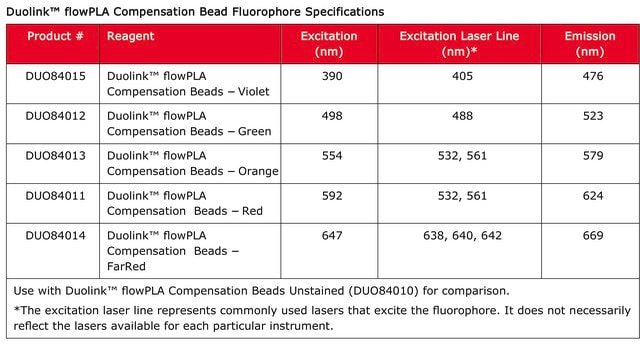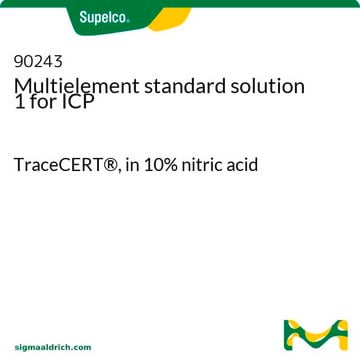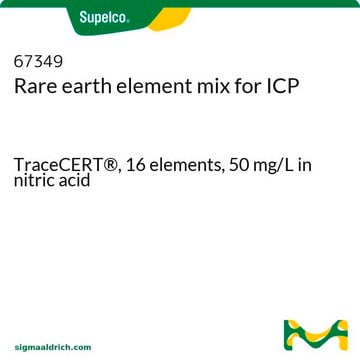DUO84010
Duolink® flowPLA Compensation Beads - Negative Control
For flow cytometry standard and multiplex analysis
Iniciar sesiónpara Ver la Fijación de precios por contrato y de la organización
About This Item
UNSPSC Code:
23201100
NACRES:
NA.32
Productos recomendados
Quality Level
product line
Duolink®
technique(s)
flow cytometry: suitable
immunocytochemistry: suitable
immunofluorescence: suitable
multiplexing: suitable
proximity ligation assay: suitable
suitability
suitable for fluorescence
shipped in
wet ice
storage temp.
2-8°C
Categorías relacionadas
Application
Duolink® proximity ligation assay(PLA®) allows for endogenous detection of protein interactions, post translational modifications, and protein expression levels at the single molecule level in fixed cells and tissue samples.
It is recommended that Duolink® compensation beads should be used when performing a multiplexed experiment (DUO96001) to save on time and reagent cost, rather than using precious sample. This product can be used to determine flow cytometry instrumentation collection parameters, inform experimental design, and as a negative control for compensation data for multiplexed FlowPLA experiments.
Visit our Duolink® PLA Resource Center for information on how to run a Duolink® experiment, applications, troubleshooting, and more.
To perform a complete Duolink® PLA in situ experiment you will need two primary antibodies (PLA, IHC, ICC or IF validated) that recognize two target epitopes. Other necessary reagents include a pair of PLA probes from different species (one PLUS and one MINUS), detection reagents, wash buffers, and mounting medium. Note that the primary antibodies must come from the same species as the Duolink® PLA probes. Analysis is carried out using standard flow cytometry equipment. Duolink® Multicolor flow PLA Reagent Pack Kits used with Duolink® PLA Multicolor Probemaker Kits will enable Multiplexing of up to 4 protein events with sensitive detection of proteins, protein-protein interactions, and protein modifications within cell populations by flow cytometry.
It is recommended that Duolink® compensation beads should be used when performing a multiplexed experiment (DUO96001) to save on time and reagent cost, rather than using precious sample. This product can be used to determine flow cytometry instrumentation collection parameters, inform experimental design, and as a negative control for compensation data for multiplexed FlowPLA experiments.
Visit our Duolink® PLA Resource Center for information on how to run a Duolink® experiment, applications, troubleshooting, and more.
To perform a complete Duolink® PLA in situ experiment you will need two primary antibodies (PLA, IHC, ICC or IF validated) that recognize two target epitopes. Other necessary reagents include a pair of PLA probes from different species (one PLUS and one MINUS), detection reagents, wash buffers, and mounting medium. Note that the primary antibodies must come from the same species as the Duolink® PLA probes. Analysis is carried out using standard flow cytometry equipment. Duolink® Multicolor flow PLA Reagent Pack Kits used with Duolink® PLA Multicolor Probemaker Kits will enable Multiplexing of up to 4 protein events with sensitive detection of proteins, protein-protein interactions, and protein modifications within cell populations by flow cytometry.
To perform a Duolink® flowPLA experiment, you will need fixed and permeabilized suspended cells, and at least two primary antibodies that specifically recognize your proteins of interest. Analysis is carried out using standard flow cytometry assay equipment. User must provide a fixed cell suspension and primary antibodies. Test your primary antibodies (IgG-class, mono- or polyclonal) in a standard immunofluorescence (IF), immunohistochemistry (IHC) or immunocytochemistry (ICC) assay to determine the optimal fixation, blocking, and titer conditions. Duolink® in situ reagents are suitable for use on fixed cells, cytospin cells, cells grown on slide, formalin-fixed, paraffin embedded (FFPE), or tissue (fresh or frozen). Flow validated antibodies are recommended.
Let us do the work for you, learn more about our Custom Service Program to accelerate your Duolink® projects
View full Duolink® product list
Let us do the work for you, learn more about our Custom Service Program to accelerate your Duolink® projects
View full Duolink® product list
Features and Benefits
- Save time and reagent cost by utilizing beads for compensation rather than precious sample and multiplex reagents
- No overexpression or genetic manipulation required
- High specificity (fewer false positives)
- Single molecule sensitivity due to rolling circle amplification
- Relative quantification possible
- No special equipment needed
- Quicker and simpler than FRET
- Increased accuracy compared to co-IP
- Publication-ready results
Components
This product is comprised of the following:
6.0 – 8.0μm polystyrene beads suitable for use in flow cytometry assays. The bead slurry should have a concentration of 1.5–3.0 million beads/mL. Negative control beads can be mixed with the compensation beads containing the fluor of interest (Duolink® flowPLA Compensation Beads), or collected alone.
6.0 – 8.0μm polystyrene beads suitable for use in flow cytometry assays. The bead slurry should have a concentration of 1.5–3.0 million beads/mL. Negative control beads can be mixed with the compensation beads containing the fluor of interest (Duolink® flowPLA Compensation Beads), or collected alone.
Legal Information
Duolink is a registered trademark of Merck KGaA, Darmstadt, Germany
PLA is a registered trademark of Merck KGaA, Darmstadt, Germany
Storage Class
12 - Non Combustible Liquids
wgk_germany
WGK 1
flash_point_f
Not applicable
flash_point_c
Not applicable
Elija entre una de las versiones más recientes:
Certificados de análisis (COA)
Lot/Batch Number
¿No ve la versión correcta?
Si necesita una versión concreta, puede buscar un certificado específico por el número de lote.
¿Ya tiene este producto?
Encuentre la documentación para los productos que ha comprado recientemente en la Biblioteca de documentos.
Nuestro equipo de científicos tiene experiencia en todas las áreas de investigación: Ciencias de la vida, Ciencia de los materiales, Síntesis química, Cromatografía, Analítica y muchas otras.
Póngase en contacto con el Servicio técnico







